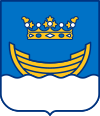Introduction
The European Union (EU) is a supranational political and economic union of 27 member states that are located primarily in Europe. The Union has a total area of 4,233,255 km2 (1,634,469 sq mi) and an estimated total population of over 448 million. The EU has often been described as a sui generis political entity (without precedent or comparison) combining the characteristics of both a federation and a confederation. Containing 5.8% of the world population in 2020, EU member states generated a nominal gross domestic product (GDP) of around US$16.6 trillion in 2022, constituting approximately one sixth of global nominal GDP. Additionally, all EU states except Bulgaria have a very high Human Development Index according to the United Nations Development Programme. Its cornerstone, the Customs Union, paved the way to establishing an internal single market based on standardised legal framework and legislation that applies in all member states in those matters, and only those matters, where the states have agreed to act as one. EU policies aim to ensure the free movement of people, goods, services and capital within the internal market; enact legislation in justice and home affairs; and maintain common policies on trade, agriculture, fisheries and regional development. Passport controls have been abolished for travel within the Schengen Area. The eurozone is a group composed of the 20 EU member states that have fully implemented the economic and monetary union and use the euro currency. Through the Common Foreign and Security Policy, the union has developed a role in external relations and defence. It maintains permanent diplomatic missions throughout the world and represents itself at the United Nations, the World Trade Organization, the G7 and the G20. Due to its global influence, the European Union has been described by some scholars as an emerging superpower. In 2012, the EU was awarded the Nobel Peace Prize. The United Kingdom became the only member state to leave the EU, in 2020; ten countries are aspiring or negotiating to join it. (Full article...) Selected article The Galileo positioning system is a proposed satellite navigation system, to be built by the European Union as an alternative to GPS (which is controlled by the United States military) and the Russian GLONASS. The system should be operational by 2010, two years later than originally anticipated. The first stage of the Galileo program was agreed upon officially on May 26, 2003 by the European Union and the European Space Agency (ESA). It is named after the Italian astronomer Galileo Galilei. The Galileo positioning system should not be referred to as GPS, which refers specifically to the existing United States system, but as "Galileo." Galileo is intended to provide: greater precision to all users, improved coverage of satellite signals at higher latitudes, which northern regions such as Scandinavia will benefit from, a positioning system upon which European nations can rely even in times of war or political disagreement. Selected pictureDid you know?...that Romania and Bulgaria became full members of the European Union on January 1, 2007? ...that the European Union's member states combined represent the world's largest economy by GDP, larger than the United States, the People's Republic of China, and Japan, the seventh largest territory in the world by area and the third largest by population after China and India? Selected cityHelsinki is the capital and largest city of Finland. It is located in the southern part of Finland on the shore of the Gulf of Finland, by the Baltic Sea. The population of the city of Helsinki is 564,643 (31.10.2006). The Helsinki urban region contains the neighboring cities of Espoo, Vantaa and Kauniainen, which are together called the Capital Region. This area has a total population of approximately 997,291 citizens. The Greater Helsinki area contains several more neighboring cities and has a population of approximately 1,293,093, which means that one out of every four Finns lives in the Greater Helsinki area. Helsinki is Finland's international gateway. The city is the country's nerve center for business, finance, fashion, medicine, entertainment, media, culture and intellectual discourse. There is a large and varied collection of museums, galleries and performance spaces. The city has Finland's largest foreign population in terms of real numbers and percentage of population. There are over 130 nationalities resident in Helsinki. General imagesThe following are images from various European Union-related articles on Wikipedia.
TopicsFeatured contentFeatured articles
Featured lists
Featured contentGood articles
CategoriesRelated portalsAssociated WikimediaThe following Wikimedia Foundation sister projects provide more on this subject:
Discover Wikipedia using portals |































































